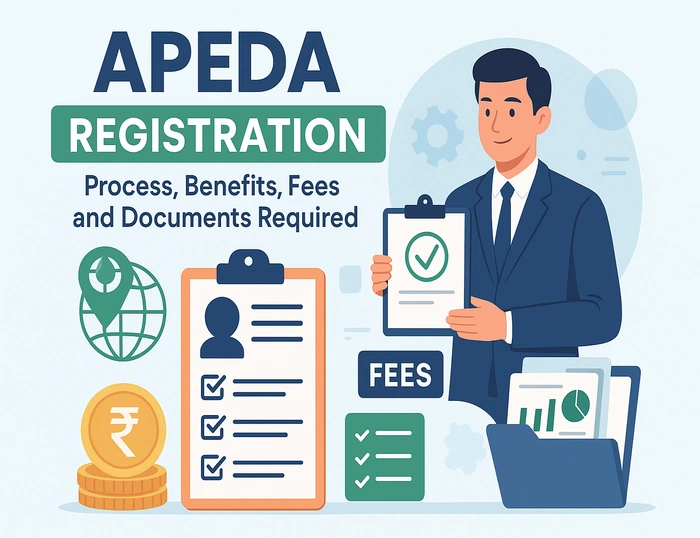
A world leader in export and production of agricultural products is India. Except for basmati rice and fruits, meat, dairy products and processed foods are also included in the country’s export basket. To promote and facilitate such exports in a simple manner, the government has created the Agricultural and Processed Food Products Export Development Authority (APEDA).
Registration with APEDA is essential for all exporters of food and agricultural products included in the lists. Registration not only keeps the exporter legally justified, but also provides credibility, subsidy facilities and scope to expand abroad. Let us know in detail about APEDA registration, its procedure, advantages and prerequisites.
What is the APEDA Registry?
APEDA is the abbreviation of Agricultural and Processed Food Products Export Development Authority, an autonomous body under the Ministry of Commerce and Industry, Government of India. APEDA was established in 1985 to develop and regulate the export of agricultural and processed food products.
Exporters handling products scheduled on the APEDA Schedule Products List must obtain APEDA registration. After registering, they receive a RCMC (Registration and Membership Certificate)which is the authorization documentation for the export of cataloged products.
The APEDA registration, unlike other licenses, which must be renewed from time to time, is a unique registration. It is a lifetime registration, which is a great relief for exporters, as it reduces administrative hassles.
APEDA Objectives
APEDA’s main objectives are broader than simply giving records. Its objective is to improve India’s agro-export infrastructure.
- Improve agricultural and processed food exports by establishing market links with the world.
- Improve product standards and quality in an attempt to compete at global levels. For example, offering pesticide-free fruits or hygienically processed meat.
- Facilitate the development of infrastructure such as cold chains, packaging plants, testing laboratories and processing plants.
- Create new exportable foods by advancing research and development (R&D).
- Provide training to exporters on international trade practices, packaging and compliance standards.
Therefore, APEDA not only enables trade but also allows Indian exporters to compete with foreign players.
APEDA functions
APEDA performs various functions to fulfill its objectives:
- Exporter Registry: Provide RCMC certificate to registered exporters.
- Financial support: Offering subsidies for infrastructure pre-installation, market promotion or packaging quality. For example, financial support can be offered for the pre-installation of pre-cooling or steam thermal treatment systems.
- Quality Certificate: Maintain quality standards in packaging, labeling and hygiene that would be a prerequisite for exporting to destinations such as the EU or the US.
- Market promotion: Holding international exhibitions, trade delegations and buyer-seller meetings to act as a liaison between exporters and foreign buyers.
- Market Intelligence: Prepare reports, forecasts and statistics to help exporters in decision making.
Products covered by APEDA
APEDA controls the export of a wide list of cataloged goods. These include:
- Fruits and Vegetables: Fresh mangoes, grapes, onions, processed fruit pulps, juices.
- Meat and Meat Products: Buffalo meat, sheep/goat meat, poultry.
- Milk products: Milk powder, butter, cheese, paneer, ghee.
- Poultry and egg products: Fresh eggs, egg powder.
- Confectionery, Bakery and Cookies.
- Honey, jaggery and sugar products.
- Alcoholic and non-alcoholic drinks: Beer and wine.
- Cereal-based foods: Wheat foods, rice foods.
Exporters should maneuver very carefully through the List of Scheduled Products on the APEDA website to determine if their product is included.
Eligibility for APEDA registration
Registration in APEDA is mandatory for:
- Exporters of cataloged agri-food products.
- All types of businesses: Proprietors, Partnerships, LLPs and Companies.
- Any company considering expanding globally in this business.
For example, if a company exports basmati rice or mango pulp, it cannot exist without APEDA registration.
Benefits of APEDA Registration
Registration with APEDA has several advantages:
- International Creditability: Buyers prefer to deal with registered exporters as it guarantees authenticity.
- Government schemes: Exporters receive subsidies for packaging, testing and infrastructure.
- Financial assistance: Assistance in establishing specialized storage, transportation or laboratory facilities.
- Export Promotion: Participation in APEDA-sponsored trade fairs, international exhibitions and brand promotion events.
- Market outlook: International demand patterns and research reports.
- Ease of compliance: Reduces paperwork and increases the likelihood of hassle-free customs clearance.
In short, registration with APEDA is not only a compliance obligation; It is a facilitator of business growth.
Documents required for APEDA registration
To apply for registration with APEDA, exporters must submit:
- Company PAN card.
- Bank Certificate or Canceled Check as proof of account.
- Import Export Code (IEC) issued by the DGFT.
- Memorandum and Articles of Association / Deed of Association depending on the business entity.
- Proof of Identity and Address of the applicant or directors/partners.
Accuracy in these documents avoids delays in approval.
APEDA Registration Process
Online registration steps
- Visit DGFT Portal: Go to DGFT website https://www.dgft.gov.in/CP/index.jsp? opt=e-RCMC (in the “Services” menu) to request your RCMC for scheduled APEDA products.
- Fill in the IEC details along with business address and company name.
- Complete the application form with the required details.
- Upload scanned documents in prescribed formats.
- Online payment of registration fee INR 5000 (excluding taxes) via debit/credit card, net banking or NEFT.
- Get DGFT Login ID and download RCMC certificate after verifying the application.
RCMC (Registration and Membership Certificate) according to DGFT
RCMC is a mandatory document for exporters. Is:
- Proof of authorization under APEDA.
- A DGFT condition for exporters of scheduled commodities.
APEDA registration fees
- Registration fee: 5900 INR (including GST).
- Payment Method: Fully online (NEFT, credit/debit card, net banking).
One-time payment valid for life, making it cost-effective compared to licenses with periodic renewal.
Validity and Renewal of the APEDA Registry
- The validity of the APEDA Certificate is 5 years.
- The exporter must request renewal to continue exporting their products.
- In case the commercial data (ownership, partners, address, etc.) is modified, exporters must notify APEDA.
APEDA Registration Cancellation
APEDA may cancel registration in the following cases:
- Failure to comply with quality or export safety standards.
- Bad behavior, such as mispresentation of products.
- Abuse of the Law or APEDA regulations.
Therefore, compliance is necessary for exporters.
APEDA Registration FAQ
Yes. Exporters of scheduled products are required to register with APEDA before exporting.
Normally 7-10 business days, subject to the accuracy of the documents.
No. Registration is entirely online through the DGFT portal.
Yes, APEDA RCMC, the exporter must apply for renewal after the 5-year validity certificate has expired.
RCMC stands for Registration and Membership Certificate and is evidence that an exporter has registered with APEDA.
If you are not registered, by law you cannot export listed products or benefit from government export incentives.
Conclusion
Registration with APEDA is mandatory for those companies that export processed foods and agricultural products. It not only ensures compliance with government regulations but also adds respectability, facilitates access to foreign markets, and offers monetary and promotional benefits.
Registration with APEDA is not simply a legal requirement for exporters; It is the key to global expansion and exposure. Having professionals like Afleo Group take care of the registration makes the process a piece of cake, quick and hassle-free, preparing your business to go global without any problems.
Do you have any questions? Please complete the following form to contact us.
Notice: JavaScript is required for this content.
#APEDA #Registration #Process #Benefits #Documents #Fees #Exporters










